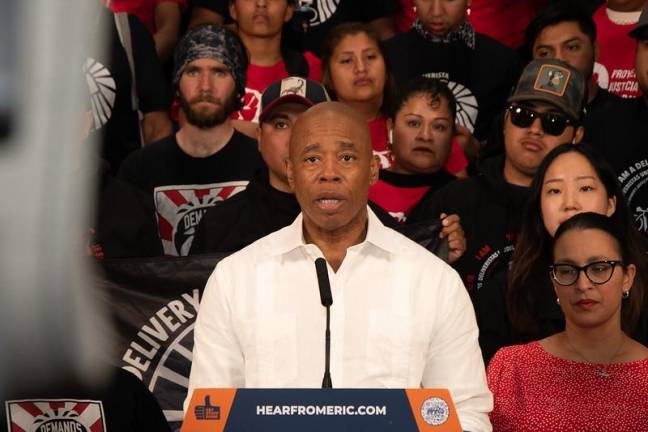NYC Deliveristas Granted Big Wage Hike
Mayor Eric Adams recently announced the new minimum wage for delivery workers citywide–$19.96 an hour, a jump-up from a median rate of $7.09 an hour. Opponents predictably say it is too big, alleging that it will kill their ride-share businesses. On the other hand, supporters of improving gig-worker conditions--such as City Comptroller Brad Lander--say the wage hike is too low and will kill workers’ ability to stay in an ever-more expensive city.

In a buoyant press event on Sunday, June 11th, Eric Adams and Department of Consumer and Worker Protection (DCWP) head Vilda Vera Mayuga announced what they hope will be received as great news for delivery workers everywhere: a minimum wage, set at roughly at $19.96 an hour. On the face of it, this would be sharp increase from the average hourly rate that delivery workers are used to, which is a mere $7. However, it will be staggered over multiple increases: first to $17.96 on July 12th, 2023, before reaching the full hike on April 1st, 2025.
Adams proclaimed that “delivery workers have consistently delivered for us—now, we are delivering for them. This new minimum pay rate, up by almost $13.00/hour, will guarantee these workers and their families can earn a living, access greater economic stability, and help keep our city’s legendary restaurant industry thriving.”
He was echoed by Mayuga, who praised delivery workers for their service to customers over the pandemic, and added that she was “proud that our city has fulfilled its promise to provide more stability and protections for 60,000 workers and get them a dignified pay rate.”
Senator Chuck Schumer was in from Washington to toast the wage hike, saying that “today we’re celebrating another major victory in our fight to deliver justice for the city’s delivery workers: raising their minimum wage to at least $19.96/hour.”
The wage hike will be implemented because of a long and winding process kicked off by a bill that the City Council passed in September of 2021, Local Law 115. The bill essentially deputized the DCWP to conduct a study examining the “working conditions of third party food delivery workers, including income, expenses, required equipment, hours worked and safety.”
Carlina Rivera, the councilmember for District 2 (which encompasses swaths of Midtown East and the East Village) and one of the sponsors of that bill, also issued a statement on the wage hike: “I commend Mayor Eric Adams and Commissioner Vilda Vera Mayuga for ensuring fair treatment and compensation for deliveristas who have been on the front lines of natural disasters, extreme weather, and the pandemic making sure New Yorkers have food, medicine, and basic necessities in our times of need.”
After a public comment period that attempted to gather both industry and employee concerns, DCWP arrived at the nearly $13 dollar wage increase. A few of the reasons given were the additional financial burdens placed on delivery workers as independent contractors (such as covering their own expenses), as well a lack of paid time off and workers’ comp insurance.
The new minimum wage that DCWP arrived at took into account how some delivery companies only pay drivers for trip time, without necessarily accounting for the amount of time a worker spends on the app overall. Companies that don’t pay for both will have to pay 20 cents more to workers per minute.
The delivery companies themselves do not appear happy about the hike, if delivery titan DoorDash is representative. A spokesperson for Doordash told Straus News: “This deeply misguided decision by the DCWP ignores the unintended consequences it will cause and sadly will undermine the very delivery workers it seeks to support. Given the broken process that resulted in such an extreme final minimum pay rule, we will continue to explore all paths forward — including litigation — to ensure we continue to best support Dashers and protect the flexibility that so many delivery workers like them depend on.”
The spokeperson added that “simply put: Dashers, merchants, and all New Yorkers deserve better than extreme policies like this. We hope that we can find a path forward that allows us to continue to best serve the communities across New York City.”
Intriguingly, one of the original stakeholders of the bill made the argument that the bill was a disgrace for having too many concessions to delivery companies, rather than too little. Brad Lander, the lead sponsor for Local Law 115 and now the New York City Comptroller, fumed in a Twitter thread that a lot had been lost and that the hike was largely phantasmal; he said that “hidden under regulatory double-speak, the rule’s average base wage for a deliverista will be just $12.69 per hour after expenses this year, according to our office’s calculations.” He bemoaned that “City Hall acquiesced to the lobbying of billion $ [sic] app companies, delaying raises owed to deliveristas & padding corporate profits off the backs of some of NYC’s hardest working NYers,” and called the hike a “subminimum wage announcement.”